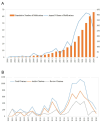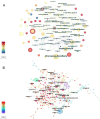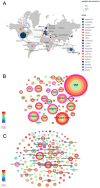Bibliometric analysis of resilience in stroke from 2000 to 2024 using CiteSpace and VOSviewer
- PMID: 40519832
- PMCID: PMC12162574
- DOI: 10.3389/fpsyg.2025.1452249
Bibliometric analysis of resilience in stroke from 2000 to 2024 using CiteSpace and VOSviewer
Abstract
Objective: This study aims to conduct a bibliometric analysis of research literature on psychological resilience among stroke survivors published from 2000 to 2024, utilizing VOSviewer and CiteSpace.
Methods: The literature data was sourced from the Web of Science Core Collection database (WoSCC). A total of 424 relevant articles, published between January 1, 2000, and April 30, 2024, were included. To analyze the literature, the software tools CiteSpace and VOSviewer were employed, examining perspectives such as authorship, country of origin, institutions, journals, references, and keywords.
Results: Since 2015, the annual publication output has steadily increased, reaching a peak in 2022 (65 articles). The United States is the most prolific contributor, with Harvard University being the leading institution in this field. Zhang W and Vranceanu A have emerged as the authors with the highest productivity, each boasting five published articles. "Stroke" is the most co-cited journal (204 times) with a high impact factor (IF 2022, 8.4). The most frequently occurring keywords are "stroke," "resilience," "depression," "health," and "quality of life." Emerging trends include research on post-stroke cognitive impairment, meta-analyses, population differences, guideline development, and symptom management.
Conclusion: This bibliometric study indicates the increased scholarly interest in investigating psychological resilience among persons who have survived a stroke over the last 24 years. The United States and China have emerged as the leading contributors to this study area, with international collaboration on the rise. To enhance this subject, subsequent studies should target refining theoretical frameworks, enhancing assessment instruments, establishing evidence-based guidelines, and developing tailored therapies that increase psychological resilience and holistic well-being for stroke survivors.
Keywords: CiteSpace; VOSviewer; bibliometric; mental health; resilience; stroke.
Copyright © 2025 Li, Soh, Jing, Wei, Rajen Durai and Soh.
Conflict of interest statement
The authors declare that the research was conducted in the absence of any commercial or financial relationships that could be construed as a potential conflict of interest.
Figures







Similar articles
-
A Bibliometric Analysis of Research Trends in Psychological Interventions for Stroke Survivors: Focusing on Resilience and Psychological Well-Being (2000-2024).J Multidiscip Healthc. 2025 Mar 19;18:1655-1678. doi: 10.2147/JMDH.S505135. eCollection 2025. J Multidiscip Healthc. 2025. PMID: 40125304 Free PMC article. Review.
-
Bibliometric analysis of stroke and quality of life.Front Neurol. 2023 Apr 11;14:1143713. doi: 10.3389/fneur.2023.1143713. eCollection 2023. Front Neurol. 2023. PMID: 37114223 Free PMC article. Review.
-
Bibliometric analysis of laryngeal cancer treatment literature (2003-2023).Heliyon. 2024 Dec 16;11(1):e40832. doi: 10.1016/j.heliyon.2024.e40832. eCollection 2025 Jan 15. Heliyon. 2024. PMID: 39811326 Free PMC article. Review.
-
Basic research on postoperative cognitive dysfunction in the past decade: a bibliometric analysis.Front Aging Neurosci. 2025 Mar 19;17:1529860. doi: 10.3389/fnagi.2025.1529860. eCollection 2025. Front Aging Neurosci. 2025. PMID: 40177252 Free PMC article.
-
Research hotspots and trends of post-stroke depression rehabilitation: a bibliometric analysis from 2003 to 2024.Front Neurol. 2025 Apr 4;16:1526506. doi: 10.3389/fneur.2025.1526506. eCollection 2025. Front Neurol. 2025. PMID: 40255888 Free PMC article.
References
Publication types
LinkOut - more resources
Full Text Sources
Miscellaneous

